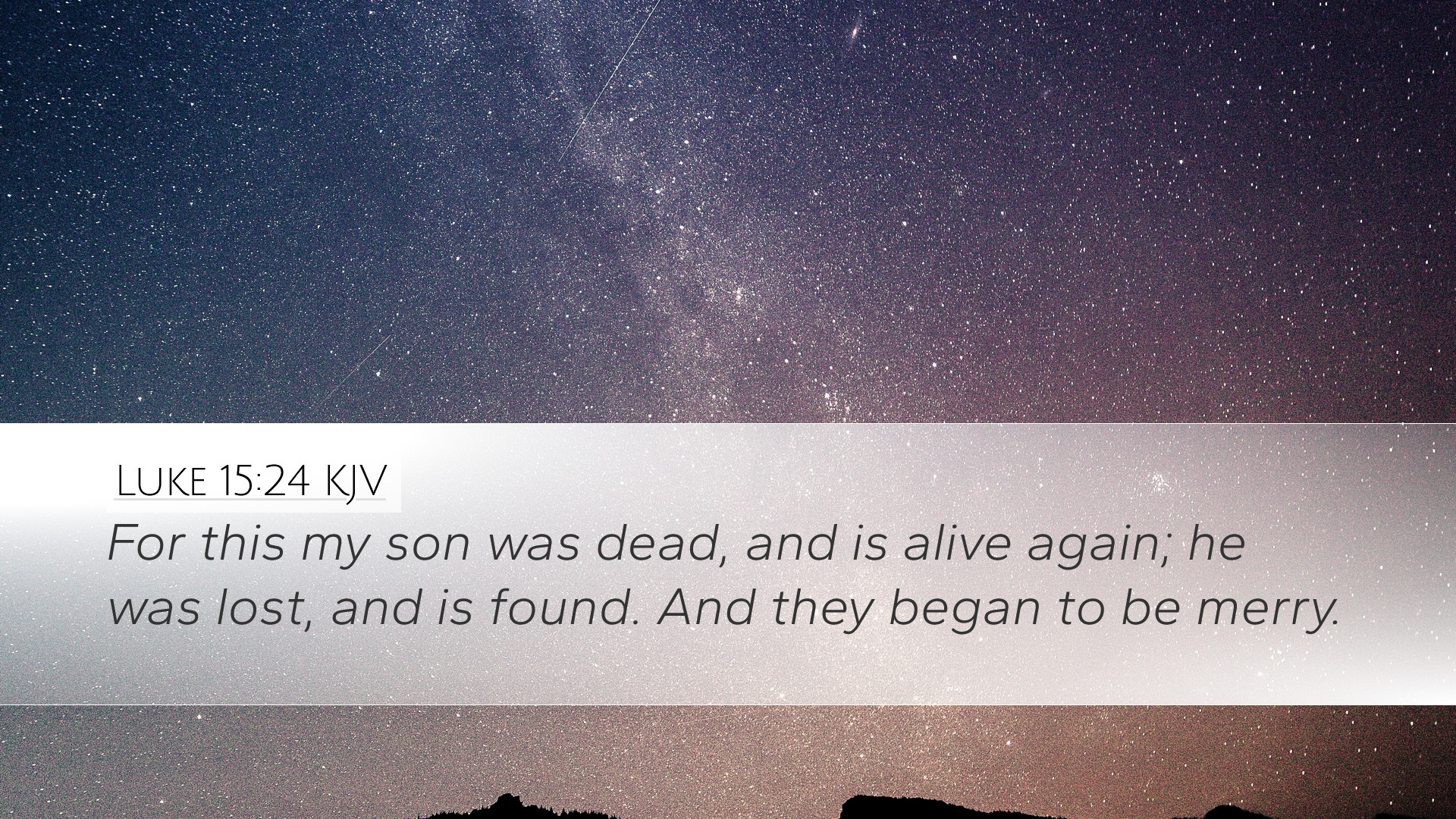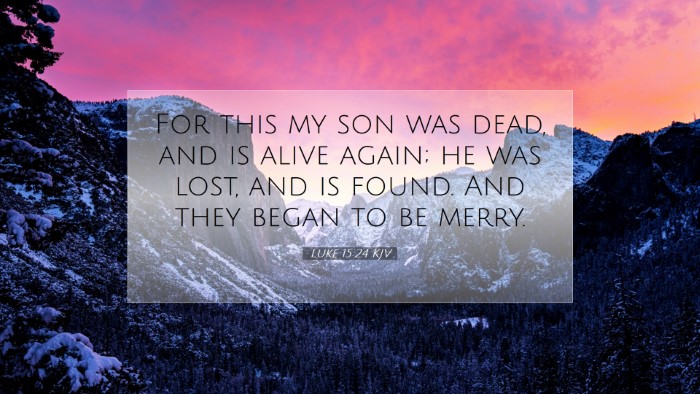Commentary on Luke 15:24
Luke 15:24 states:
"For this my son was dead, and is alive again; he was lost, and is found." And they began to be merry.
Overview of the Parable
This verse is a pivotal part of the Parable of the Prodigal Son, a profound narrative that richly illustrates God's grace and forgiveness. Right after the younger son returns home after squandering his inheritance, the father joyfully celebrates his return, emphasizing the themes of redemption, reconciliation, and unconditional love.
Insights from Public Domain Commentaries
-
Matthew Henry's Commentary
Theme of Death and Life: Henry emphasizes the spiritual death that the prodigal son experienced during his time away from the father. This separation symbolizes a life devoid of the blessings of God. The father's words encapsulate the transformative experience of repentance. When the son returns, it is as if he has been resurrected from the dead—a powerful image of spiritual renewal.
The Reality of Being Lost: Henry notes that being 'lost' reflects a state of alienation not only from family but from God Himself. The father's declaration serves to highlight that true belonging comes from being in the right relationship with the father, echoing the longing in every believer's heart to return to God.
Celebration of Return: The statement "they began to be merry" signifies a communal joy that accompanies restoration. Henry comments on the importance of community in the life of believers, suggesting that the celebration of one who returns to faith should be a corporate affair, marking the joy of reconciliation among God's people.
-
Albert Barnes' Notes on the Bible
Significance of "Alive Again": Barnes elaborates that the phrase "is alive again" speaks to both physical and spiritual resurrection. It conveys the joy of reclaiming one who was lost not just to family but to the eternal promise of God. The transformation must be acknowledged as both a return from sin and a return to life itself—illustrating the believer’s experience of coming back into the fold of God’s grace.
Context of Celebration: Barnes highlights that the response of joy is essential to understanding God’s nature. He underscores God’s desire for redemption and His delight in restoring those who turn back to Him. This resonates with the overall context of the chapter, where Jesus emphasizes how heaven rejoices over one sinner who repents.
Both Sons in Perspective: Barnes also notes that while the narrative focuses on the younger son, the elder son remains significant. The elder son’s struggle with jealousy and entitlement provides an invitation for self-examination within the community of faith, calling them to recognize their own need for grace.
-
Adam Clarke's Commentary
Father's Compassion: Clarke reflects upon the father’s action as a vivid demonstration of divine compassion. The father's open arms serve as an allegory for God’s readiness to forgive and embrace those who repent. Clarke emphasizes that the father's joy is the joy of God when a sinner seeks reconciliation. The readiness to forgive lies at the core of God’s character.
Repentance Leading to Restoration: Clarke elaborates on the transformative effect of genuine repentance. When the prodigal son acknowledges his wrongdoings, the father immediately responds with love and acceptance rather than reproach—a model for how believers should embrace those returning to faith.
Festivities Symbolizing Grace: Clarke notes the significance of the feast that follows the son’s return. The celebratory nature of the occasion symbolizes not just personal restoration, but the outpouring of grace that God has for humanity. It's a reminder to the church that those who come to faith should be welcomed with open arms, celebrated for their return to life.
Theological Implications
This passage presents several theological implications vital for both personal and communal applications:
- The Nature of God: The father’s joy and acceptance reflect God’s nature as forgiving and merciful. It teaches believers that no one is beyond the reach of divine grace.
- The Importance of Repentance: The son’s journey emphasizes the necessity of acknowledging one’s sinfulness. True repentance is crucial for restoration and is a fundamental tenant of Christian faith.
- Celebration in Community: The community’s involvement in the celebration illustrates the corporate nature of salvation. Believers are called to rejoice together in the transformative power of God’s grace.
- Awareness of Our Own Condition: The elder brother's attitude serves as a cautionary tale. It prompts reflection on our own attitudes towards grace and forgiveness, pushing us to examine whether we reflect the father’s love in our relationships.
Applications for Ministry
Ministers, scholars, and students can take several applications from Luke 15:24:
- Encouraging Repentance: Church leaders should convey the message of God's readiness to forgive, inspiring people to repent and seek reconciliation with God.
- Promoting a Culture of Joy: Churches should foster a culture that rejoices in conversions and restorations, reflecting the heavenly celebration that Jesus describes.
- Addressing Jealousy and Resentment: Teachings should address the elder son's sentiments, encouraging self-reflection about the grace we extend to others in the community.
- Creating Community for the Lost: Ministries can focus on outreach to those who feel lost or estranged, ensuring a welcoming atmosphere that mirrors the father's embrace.
Conclusion
Luke 15:24 provides a profound insight into the heart of God, showcasing the joy of restoration through forgiveness. Both the father’s compassion and the son’s return serve as critical reminders of God’s nature and the call for believers to extend grace to one another. May this verse inspire those in ministry, education, and scholarship to further explore and exemplify the deep love that characterizes the relationship between God and humanity.


